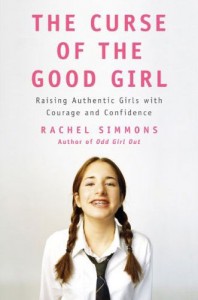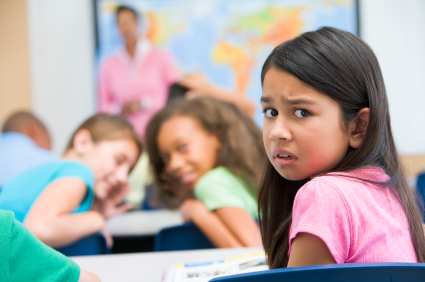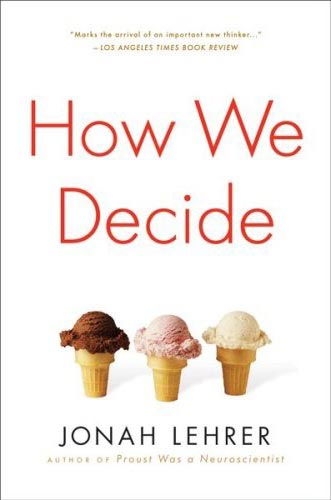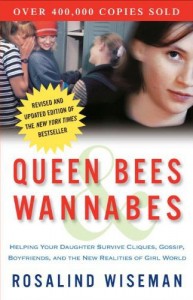
The Curse of the Good Girl by Rachel Simmons
If you live or work with teen girls you don’t need me to tell you they can be way out there with their emotions. And you already know that girl friendships can be fraught with drama, misunderstandings, betrayals and recriminations. Which proves that being emotional doesn’t automatically translate into high Emotional Intelligence. (EQ, AKA getting real with yourself so you can be real with the people you’re close to. )
When teen girl emotion explodes around parents, they often do what moms and dads of my parents’ generation did… try to contain and sanitize the feelings. Why? Perhaps some parents sincerely believe that people who are too emotional get clobbered by life. Another possibility is that when confronted with a girl’s outburst that parents can’t “fix” the next best solution is to try to shut it down as quickly as possible. Either way the message is that some emotions are just not the “good girl” kind.
If a girl expresses sadness she may hear: “Cheer up. It can’t be all that bad!”
If she expresses fear she might get: “There’s nothing to be afraid of!”
If she rages over some real or imagined injustice she may be treated to some variation of this 20th century chestnut: “Better watch it, young lady. You’re getting a little too big for your britches.”
When I was a child, the most powerful phrase I knew was “Shut up!” Only used in a rare moment of frustration and laughably tame by today’s standards, those words were consistent show stoppers in my family and always followed by: “That language is unacceptable.” I realize now that it was my assertiveness that was truly unacceptable.
21st century parental messages to girls haven’t changed all the much: Don’t be sad. Don’t be scared. Don’t be angry. Oh, and while you’re at it: Don’t be shy. Don’t be worried. Don’t be embarrassed. Don’t be so silly. Don’t be so dramatic. Don’t be so smart.
If girls can’t be any of those things, what, in heaven’s name, are they supposed to be? Duh! They’re supposed to be GOOD! At all times sweet, loving and cooperative. Modest, supportive, nurturing, generous and nice. But what are girls expected to do when any of those other not so good and not so nice feelings pop up? No problem. If you want to be a good girl (Yes, please!) you learn to stuff it and smile.
In this week’s podcast I talk with Rachel Simmons, author of The Curse of the Good Girl: Raising Authentic Girls with Courage and Confidence. And what a terrific and important book it is. Here’s an excerpt:
________
To deepen your vision for your daughter, write her a letter (you don’t have to send it) and explore these questions:
- What do you wish you had known when you were her age? Think about the girl you used to be and the woman you are today. Focus on what you have learned about relationships, conflict, and self-confidence.
- What does being yourself mean to you?
- What did the female role models of your childhood teach you? If you did not have any, what do you wish you might have learned from a caring adult woman?
You have learned many lessons in your life. By defining them for yourself, you can begin thinking about how to convey practical wisdom to your daughter, in both what you say and how you act.
____________
Listen to my interview with Rachel Simmons right here:
[QUICKTIME http://www.anniefox.com/podcast/FC011.m4a 300 300 false true]
If you have iTunes, you can subscribe to this podcast in the iTunes Store.
Or, you can download an MP3 version here.
Upcoming guests include:
Rosalind Wiseman, author of Queen Bees & Wanna Bees and Queen Bee Moms & Kingpin Dads
Izzy Rose, author of The Package Deal: My (not-so) Glamorous Transition from Single Gal to Instant Mom
Diane E. Levin, co-author (with Jean Kilbourne) of So Sexy So Soon: The New Sexualized Childhood And What Parents Can Do to Protect Their Kids
Susan M. Heim, author of It’s Twins! and Chicken Soup for the Soul Twins and More
Hannah Friedman, author of Everything Sucks: Losing My Mind and Finding Myself in a High School Quest for Cool
Dara Chadwick, author of You’d Be So Pretty If…
*What’s a podcast? “A podcast is a series of digital media files, usually either digital audio or video, that is made available for download via web syndication.” –Wikipedia… So, in this case, there’s an audio file for you to listen to (in addition to reading the above).
















